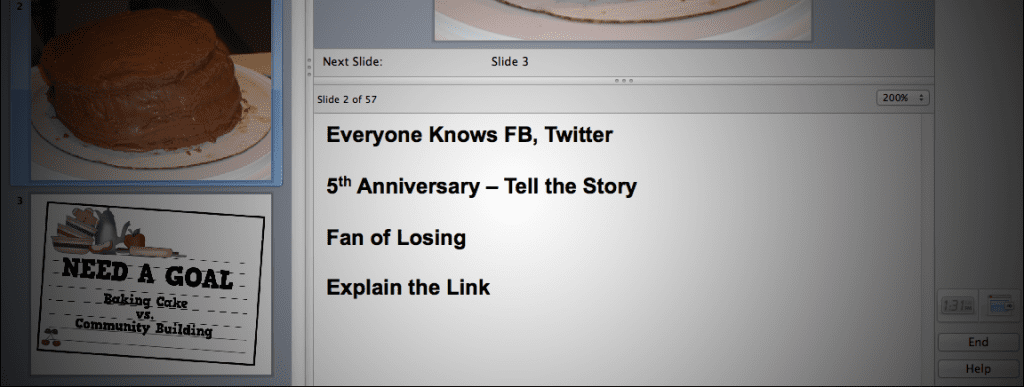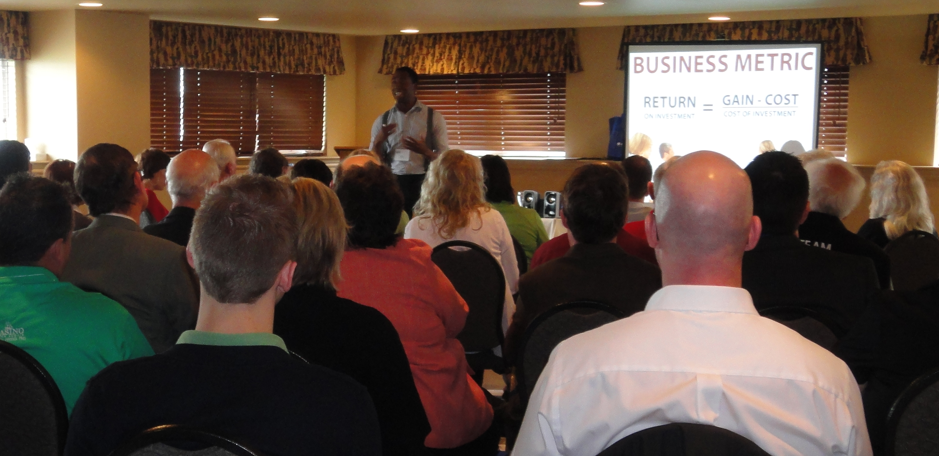People want less lecturers putting them to sleep and more quality presenters keeping them entertained and educated. A captvating storyteller can truly be the key difference between an audience that goes to sleep during a workshop and one that wants to stay late just to ask another question or two.
Here’s how you can step up your workshop game or get the most out of the people you hire to run a company wide workshop:
Workshop Tactic #1: Craft the Fundamentals
Before you actually run the workshop you need to promote it and before you promote it you need to cover the basics.
First, you need to identify your target market for the workshop and then identify the message that will truly help your target market get to the next level. Take the time to put yourself in their shoes and ask yourself what is that they really need to know, what do they need to get the next level and what can I do to help them get there. These questions will help guide the flow, formality and framework of the workshop. Once that’s accomplished, you break out the basics:
Compelling Headlines: The presentations that recieve the most votes during SXSW Interactive are always the ones with an intriguing and compelling titles. Keep this in mind when crafting the title of your workshop and consider effective formulas that will make your headlines work.
Craft a Theme: Our ability to craft a theme when delivering a complex message makes it easier to understand. When I talk about striving for social media success – I deliver the workshop through a lens that is focused on the similarities between social media success and success when it comes to to baking a cake. It’s a theme that runs throughout the workshop and a theme that sticks with people because it’s easy to understand.
The Value of Attending: The attendees want to know what it is they will get out of attending your workshop. Typically, these attendees will be people who have very little time on their hands so they need to understand the value you’ll be providing. Tell them exactly what they’ll walk away with – Here’s a great example from DefCon showing how this is done:
Workshop Tactic #2: Get to know the Group
To start with, I’m obsessed when it comes to getting to know people who I meet when presenting or running workshops. I want to learn about their culture, I want to read their local papers and I want to grab a local bite as soon as I arrive off the plane. An example of this was at a recent workshop in Newfoundland where I began by talking to a few people about a local dish called Touton and how if there was one thing I need to try before I left – That was it. They were instantly engaged and wanted to help me find this dish before I left.
A workshop is a lot different from simply getting on stage and speaking for an hour. A workshop is about two way communication and a dash of off topic conversations that provide insights specific to individual questions or problems. This is why it’s important to make the group as comfortable as possible from the beginning. You want the group to feel comfortable interrupting you and encourage a dialogue rather than a four hour monologue.
The best way to break the ice is to get them talking.
Evaluate how many people you have in the room and depending on the number go around the room and have them answer some simple questions. If you’ve got a large group, all you will need to ask the group is their name and what they want to get out of the presentation. If you have a smaller group you have a chance to be creative and possibly ask them for a personal experience or something that will lead to them telling you a story. At the same time, before you start this – You go first.
Workshop Tactic #3: Be a Storyteller not a Lecturer

This may be the most important advice you read in this entire post. If you’ve made it this far good job – You’re in for a treat. This piece of advice changed my entire approach to presenting and storytelling. The story that you tell will make or break your workshop. Your decision to act as a lecturer or a storyteller will determine whether people go to sleep or stay awake.
You’re not hired to lecture. You’re hired to facilitate learning through storytelling.
When you craft your workshop you need to ensure that there is a compelling and obvious theme that runs from start to finish. An introduction that will immediately grab their attention through shock, insight and/or humour. Constant interjections of memorable and uplifting stories that the group will remember never forget. And finally, a hint of self-deprecation and humour to ensure that the group knows that you don’t take yourself too seriously.
Workshop Tactic #4: Passion vs. Memorization
The emotions you show as you present matters. Have you ever seen awards for The Most Apathetic Director of the Year award or this years Award Winning Dispassionate Supporting Actress? No. Never. Great presenters, storytellers and communicators ignite our passion and inspiration through their behavior as they deliver their message. Some of the greatest speeches in advertising were great solely because of the passion found within them. These storytellers know their lines like the back of their hands but they dont show it. Their stories aren’t told from memory but instead through emotions and pure passion for the topic at hand.
When you’re passionate about the topic and are speaking from experience, instinct, knowledge and pure passion – The audience will feel it. You’ll be able to feel the connection you’re making with each individual and as you start to make eye contact you will start to see nods of approval and wide-eyes indicating light bulbs going off.
Worst than memorization is a lack of preparation at all. This results in a speaker who simply reads directly off the slides (as if they audience cant read). When you read your slides it immediately demonstrates a lack of preparation and gives the audience a reason to tune you out as they can read the text in their head faster than you can out loud.
I like to use Presenter Tools during my presentations so I can know what slide is coming next and what key points I need to hit as soon as the slide comes up. I don’t write what I’m going to say word for word in the notes section, that would encourage line reading. Instead, I write one liners that trigger my memory in a way that allows me to get back on track. Here are four one liners that help me turn this slide into a 5 minute story.

Workshop Tactic #5: Spark a Discussion
A full-day workshop can be daunting for both you and your audience if it’s just you and your slides. The key to making the workshop enjoyable and compelling is by getting your audience involved through activity or conversation. Two easy ways to accomplish this is to ask a question or passing around tasks that get the audience working together. Anything that allows you to take a break from telling your stories is where the magic starts to happen.
The best advice I ever had when it came to receiving questions during a workshop came from a surprising read. It was actually a quote from Bruce Lee that flipped off a switch in my mind and has since changed the way I deliver my workshops. He said, Now water can flow or it can crash. Be water, my friend.
What does Bruce mean by be water? He means be able to adapt. If you pour water into a cup it becomes a cup – If you pour water into a bottle it becomes one with the bottle. Thus, as you start to spark questions and deliver your workshop be able to adjust your material for your audience. Be like water and let the organic conversations determine your shape and approach to the group. Once you do that – You’re Golden.
Wrap Up
So there you have it. Five of my tried and tested tactics that consistently yield a solid response from my workshop attendees. As you can see from these items above, it doesn’t take much more than passion and practice to truly start delivering memorable workshops.
Now you are ready to start running your own workshops or at least having an idea of what you need from a great presenter to deliver one. Best of luck and may the odds be ever in your favour!


